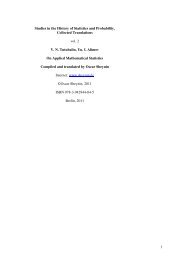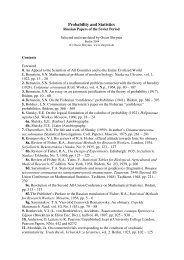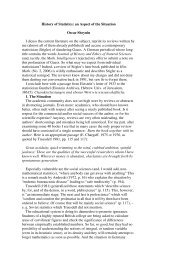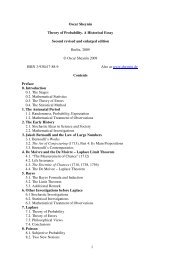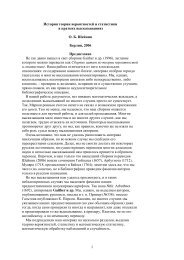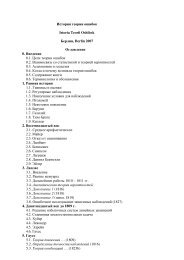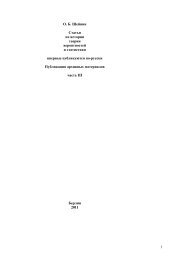observations for its power with regard to a certain class of alternatives to become not lessthan 1/2, the Kolmogorov criterion under the same conditions only dem<strong>and</strong>s n 4/5observations. In other words, the limiting efficiency of the former test as compared with thelatter is zero.Non-parametric methods are now in the stage of intense development. The problemsconnected with the estimation of their comparative power <strong>and</strong> efficiency in differentsituations occurring in practice are far from being solved. A number of important statisticalproblems is not yet covered by non-parametric criteria (for example, the estimation of theagreement between a hypothetically given multidimensional law of distribution <strong>and</strong> thecorresponding empirically observed distribution; of the discrepancy between twoindependent samples from a multidimensional general population, etc).For a number of practical applications some criteria of the non-parametric typenevertheless dem<strong>and</strong> a preliminary estimate of the parameters <strong>and</strong> new problemsinsufficiently studied even in the simplest cases (for example, already when checking thenormality of the observed distribution of a given indicator) present themselves here. Inaddition, applications dem<strong>and</strong> specification of asymptotic formulas <strong>and</strong> compilation of tablesof the distribution functions of tests adapted for finite samples.Many new problems whose solution is very difficult have appeared before non-parametricstatistics in connection with the theory of stochastic processes which is the main channel ofinvestigations stimulated by ever increasing dem<strong>and</strong>s made by physics <strong>and</strong> technology. Inthis comparatively young field of science the possibility of a fruitful application of statisticalmethods, possessing a wider scientific foundation <strong>and</strong> not restricted by the narrowassumptions of the classical methodology, appears as a significant <strong>and</strong> progressivephenomenon.Notes1. {The author said nothing about the studies of population, the main field of work of theContinental direction of statistics since the end of the 19 th century (Lexis, Bortkiewicz,Chuprov, Markov).}2. {Already in the 19 th century, statistics became essential for several branches of medicine<strong>and</strong> psychology, see my papers in Arch. Hist. Ex. Sci., vol. 26, 1982, <strong>and</strong> Brit. J. Math., Stat.Psychology, vol. 57, 2004.}References1. Kolmogorov, A.N. (1942), Determining the center of scattering <strong>and</strong> the measure ofprecision given a restricted number of observations. Izvestia Akad. Nauk SSSR, ser. Math.,vol. 6, pp. 3 – 32. Translated in <strong>Probability</strong> <strong>and</strong> <strong>Statistics</strong>. Russian papers of the <strong>Soviet</strong>Period. Berlin, 2005.2. Kolmogorov, A.N. (1950), Unbiased estimators. Translated in his Sel. Works, vol. 2.Dordrecht, 1992.3. Kolmogorov, A.N. (1951), % & ... (StatisticalAcceptance Inspection When the Admissible Number of the Accepted Defective Articles IsZero). L.4. Sirazhdinov, S.Kh. (1957), Unbiased estimators of the relative number of accepteddefective articles when applying the method of single sampling. Trudy Inst. Matematiki iMekhaniki Akad. Nauk Uzbek <strong>Soviet</strong> Socialist Republic, vol. 20, pp. 89 – 100.5. Mikhalevich, V.S. (1956), Sequential Bayesian solutions <strong>and</strong> the optimal methods ofstatistical acceptance inspection. Teoria Veroiatnostei i Ee Primenenia, vol. 1, 1956, pp. 437– 465.6. Aivazian, S.A. (1959), Comparison of the optimal properties of the Neyman – Pearson<strong>and</strong> the Wald criteria. Ibidem, vol. 4, 1959, pp. 86 – 93.
<strong>7.</strong> Gren<strong>and</strong>er, U., Rosenblatt, M. (1955), Statistical Analysis of Stationary Time Series.New York.14. A.N. Kolmogorov. Issues in the Theory of <strong>Probability</strong> <strong>and</strong> Mathematical <strong>Statistics</strong>Report Made at the Branch of Mathematics, Academy of Sciences of the <strong>Soviet</strong> UnionVestnik Akademii Nauk SSSR, No. 5, vol. 35, 1965, pp. 94 – 96 …[1] I would like to begin the review of the present state <strong>and</strong> the main directions of thedevelopment of probability theory <strong>and</strong> mathematical statistics by mentioning that vol. 4 ofS.N. Bernstein’s (Coll. Works. N.p., 1964) containing {almost} all hiswritings on the theory of probability <strong>and</strong> statistics has appeared. Something is therenowadays interesting mainly for the history of science since it had been included, in a moreclear form, in textbooks, but the store of ideas, far from being exhausted, <strong>and</strong> sometimesinsufficiently known to young researchers, is also vast.Issues belonging to the domain of limit theorems going back to Chebyshev <strong>and</strong> Liapunov,<strong>and</strong> essentially developed by Markov <strong>and</strong> Bernstein in the direction of studying dependentvariables, which seemed for some time to be exhausted, experiences a period of newflourishing. V.A. Statuljavicus’ report “Limit theorems in boundary value problems <strong>and</strong>some of their applications”, read out on 29 Oct. 1964 at the General meeting of theAcademy’s section of mathematics on the theory of probability <strong>and</strong> mathematical statistics,was devoted to some pertinent issues.[2] At the same meeting, A.A. Borovkov reported on a cycle of works which goes back toanother current in the field of limit theorems apparently originated by Cramér, – to the socalledtheorems on large deviations. Borovkov’s works are beginning to show importance forapplications in mathematical statistics <strong>and</strong> it is worthwhile to dwell somewhat on this point.The simplest typical problems of mathematical statistics contain two parameters, significancelevel (the admissible probability of a mistaken judgement) <strong>and</strong> n, the number ofobservations. The approach based on limit theorems of the Chebyshev type corresponds to alimiting transition (n ) with a constant . However, in practice n is often of the order ofonly a few hundred, or even a few dozens, <strong>and</strong> the significance level is usually chosen in theinterval from 0.05 to 0.001. The number of problems dem<strong>and</strong>ing the guarantee of a very highreliability, i.e., of a very small , will probably increase ever more. Therefore, the formulasof the theory of large deviations corresponding to the asymptotic case at 0 are more oftenapplicable.[3] Markov originated the study of a vast class of stochastic processes now everywherecalled Markov processes. After his time, our country continued to play a very large part indeveloping this direction, especially owing to the Dynkin school. Problems of obtaining thewidest possible general conditions for the applicability of the main theorems of the theory ofMarkov processes; of ridding the theory of superfluous assumptions are still unsolved.However, I believe that the most essential work is here the search for new issues even if thesedo not dem<strong>and</strong> the use of excessively refined mathematical tools but cover a wider field ofapplications.In particular, an urgent issue is the study of only partly observable Markov processes, i.e.,processes of the type of x(t) = {x 1 (t); x 2 (t)} where only the first component, x 1 (t), isobservable. R.L. Stratonovich, in his theory of conditional Markov processes, formulatedextremely interesting ideas about the approaches to solving the problems here encountered.Regrettably, his works sometimes lack not only any special mathematical refinement, but areoften carried out on a level that does not guarantee a reasonable rigor not absolute, but
- Page 4 and 5:
[3] I bear in mind the well-known p
- Page 6 and 7:
successes of physical statistics. B
- Page 8 and 9:
classes of independent facts whose
- Page 10 and 11:
distribution is a corollary of the
- Page 12 and 13:
examine in the first place the curv
- Page 14 and 15:
12. According to Bortkiewicz’ ter
- Page 16 and 17:
generality, the similarities taking
- Page 18 and 19:
one on another, as well as the corr
- Page 20 and 21:
is inapplicable because the right s
- Page 22 and 23:
Instead, Slutsky introduced new not
- Page 24 and 25:
abandoned in August 1936, but it is
- Page 26 and 27:
last decades, mathematicians more o
- Page 28 and 29:
charged with making the leading ple
- Page 30 and 31:
motion and a number of others) are
- Page 32 and 33:
phenomena. It is self-evident that
- Page 34 and 35:
Such new demands were formulated in
- Page 36 and 37:
The addition of independent random
- Page 38 and 39:
automatic lathes, etc. Here, the ma
- Page 40 and 41:
11. Kolmogorov, A.N. Grundbegriffe
- Page 42 and 43:
period 1 and remained, until the ap
- Page 44 and 45:
of the analytical tool rather than
- Page 46 and 47:
with probability approaching unity,
- Page 48 and 49:
logic. The ensuing vagueness in his
- Page 50 and 51:
2. Gnedenko, B.V. (1949), On Lobach
- Page 52 and 53:
will be sufficient, although not ne
- Page 54 and 55:
nlimk = 1P(| k (n) - m k (n) | > H
- Page 56 and 57:
favorite classical issue as the gam
- Page 58 and 59:
and some quite definite (not depend
- Page 60 and 61:
influenced by a construction that a
- Page 62 and 63:
P ij (1) = p ij (1) , P ij (t) =kP
- Page 64 and 65:
4.2d. Bebutov [1; 2] as well as Kry
- Page 66 and 67:
are yet no limit theorems correspon
- Page 68 and 69:
described, from the viewpoint that
- Page 70 and 71:
conditional variance and determined
- Page 72 and 73:
Romanovsky [45] and Kolmogorov [46]
- Page 74 and 75: Let S be the general population wit
- Page 76 and 77: Part 1. Russian/Soviet AuthorsAmbar
- Page 78 and 79: 2. On necessary and sufficient cond
- Page 80 and 81: Gnedenko, B.V., Groshev, A.V. 1. On
- Page 82 and 83: 52. ( (Mathematical Principl
- Page 84 and 85: Kozuliaev, P.A. 1. Sur la répartit
- Page 86 and 87: Obukhov, A.M. 1. Normal correlation
- Page 88 and 89: 30. Généralisations d’un théor
- Page 90 and 91: 22. Alcune applicazioni dei coeffic
- Page 92 and 93: 10. A.N. Kolmogorov. The Theory of
- Page 94 and 95: Kuznetsov, Stratonovich & Tikhonov
- Page 96 and 97: In the homogeneous case H s t = H t
- Page 98 and 99: to such a generalization. He only s
- Page 100 and 101: In the particular case of a charact
- Page 102 and 103: as it is usual for the modern theor
- Page 104 and 105: 1. {The second reference to Pugache
- Page 106 and 107: Smirnov, Romanovsky and others made
- Page 108 and 109: determined the precise asymptotic c
- Page 110 and 111: for finite values of N, M and R 2 .
- Page 112 and 113: Mikhalevich’s findings by far exc
- Page 114 and 115: Uch. Zap. = Uchenye ZapiskiUkr = Uk
- Page 116 and 117: Khinchin, A.Ya. 43. Math. Ann. 101,
- Page 118 and 119: 7. DAN 115, 1957, 49 - 52.Pinsker,
- Page 120 and 121: Anderson, T.W., Darling, D.A. (1952
- Page 122 and 123: Statistical problems in radio engin
- Page 126 and 127: securing against mistakes (A.N. Kry
- Page 128 and 129: of the others, then its distributio
- Page 130 and 131: In Kiev, in the 1930s, N.M. Krylov



